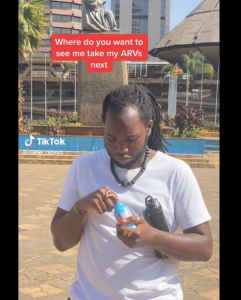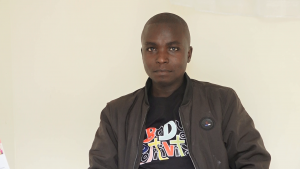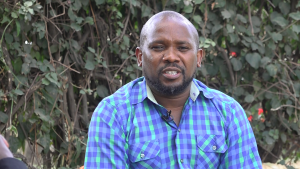By Eliud Mutwiri
Kenya has made commendable steps in the fight against the Human Immunodeficiency Virus (HIV). However, stigmatization, isolation, ridicule, and insults are some of the many challenges that Kenyans living with HIV face in society.
I met and interacted with some of these young people in Nairobi City County.
Farida, not her real name, is 25 years old. She got infected at birth but only became aware of her HIV-positive status in 2008 when she was 8.
This discovery which was followed by her enrollment for medication ignited unforeseen problems. She had to change schools more than twice due to stigma after her peers knew about her status.
“I went to high school. I used to take my medication and other students would always ask me what drugs they were. There was a day I went to play and when I came back to the dormitory, I found my box and bed outside,” she recalls.
“Upon inquiry, the other students told me they did not want to associate with someone who is HIV positive. This hurt me. People were also very harsh to me,” Farida painfully added saying potential suitors stayed away from her declaring they cannot marry someone living with HIV.
Norah, not her real name, shares her ordeal, similar to Farida’s story of isolation and ridicule at school.
The 20-year-old remembers being told by her mother to take some drugs throughout her childhood albeit not being told what the drugs cured or prevented.
She came to discover they were Anti-Retroviral drugs (ARVs) when she was in standard seven. This happened when she had gone for a refill of the drugs at a health facility. She reveals that she meditated committing suicide after this discovery.
Norah had written a suicide note and was on the cusp of ending her life when her brother intervened by talking her out of it.
In 2011, upon completing high school, 27-year-old Mercy, not her real name, an orphan, learned that she had been infected with HIV at a time when she was also pregnant. Since then, she was thrusted to seclusion by her relatives.
“I started taking my medication and my child was also put under medication upon delivery. I hid my HIV positive condition from my relatives for a while. I was living with my cousin. However, they later became aware of my condition,” she narrates.
“Having learnt this, they started hurling insults at me. Even when I cooked, they couldn’t eat as they were afraid I could infect them. I was also babysitting my cousin’s child who ended up being taken away from me, and later my cousin also ran away from me and went to rent a house somewhere else, alone,” Mercy recounts the tale of being shunned by family members.
For a month Mercy was staying with a well wisher, a doctor who was aware of her situation.
She later went to stay with her cousin’s mother back in the village. There, the stigmatization got worse and she was unable to cope. She found herself back in Nairobi where she now stays with a friend who is aware of her HIV status.
Mercy, who does casual jobs, emphasizes the need for disclosing one’s HIV-positive status to someone they can trust. She is currently independent of her relatives.
Adolescents and other youths are at more risk of contracting HIV. This is according to The National Syndemic Diseases Control Council (NSDCC).
Recent reports published by NSDCC raise concerns over the infection rates among young adults. People aged 15-29 years accounted for 61% and 52% of all new infections in 2020 and 2021 respectively.
Youth living with HIV are, however, hopeful of leading normal lives by taking their ARVs every single day as prescribed.

The 26-year-old Ruele Okeyo is the true definition of a youthful HIV champion who has decided not to fight a silent battle against HIV.
He tested positive on 26th September 2020. This was his second visit to test for HIV after he did the first test in August of the same year.
He however feels aggrieved about the fact that he got infected after his first sexual encounter with a partner wishing he even contracted a curable Sexually Transmitted Infection (STI).
Why is Ruele the ‘youthful HIV champion?’
Upon learning about his HIV status, he shares that he thought of transmitting the virus to others (something he confirms he did not do) but he instead made a conscious decision to channel the anger he had into something positive.
This resulted in him starting a podcast at a time when he knew little about social media. He began an advocacy-oriented podcast biased toward creating awareness of HIV and Sexual Reproductive Health Rights.
Apart from creating awareness about HIV through advocacy, he uses his social media platforms to create content of himself taking ARVs.
“I have taken my medication in hotels, in matatus, around the National Archives building in Nairobi, in the airport…,” Ruele mentions the endless list of places where he has publicly taken his ARVs.
This has made many people living with HIV who are struggling to take ARVs to reach out to him for motivation to help them stick to their medication.
“Stigma still exists to date. My work is trying to demystify all the perceptions that people have in regard to people living with HIV and the challenge that is there is people taking their medication,” details Ruele who has had a first-hand encounter with stigmatization.
Okeyo is also a member of the queer community. He runs a safe house for LGBTQ+ youth rendered homeless by their parents, guardians, or partners.
Being queer has exposed him to a lot of harsh criticism that makes him avoid walking in the streets of Nairobi where he is most often verbally attacked.
“In order for us to have zero transmissions of HIV, it has to start with you. So, do what you must however you can, and just start (or adhere to) your medication,” the Undetectable equals Untransmittable (U=U) ambassador for the African Forum advises boldly.
U=U is part of the Prevention Access Campaign. U=U advocates that people living with HIV could achieve and maintain an undetectable viral load by taking ARVs daily as prescribed and as such cannot transmit the virus to other members of the society.
Glimmer of Hope for Youth Living With HIV
A project dubbed ‘Youth Care’ which is funded by AIDSFONDS and is run by 3 NGOs has come to the rescue of these youth.
The agencies include, Network for Adolescent and Youth of Africa (NAYA Kenya), Pediatric-Adolescent Treatment Africa (PATA) and Ambassadors for Youth and Adolescents Reproductive Health Programme (AYARHEP).
They have offered a glimmer of hope for youth living with aids in Homabay and Nairobi counties.
In Nairobi, the program targets Kamukunji, Mathare and Starehe Sub-counties. It aims at ensuring that youth living with HIV access treatment and other related services. It also lobbies for the implementation of policies that are responsive to the needs of this group of youth.
Norah, Mercy, Farida, and Lydia are beneficiaries of the project which has reached a number of youths who have lauded it.
They are engaged as peer supporters in health facilities in the targeted areas. Apart from holding community health talks, they hold support group forums where they get to share their stories and encourage each other in their battle against HIV.
“This program (Youth Care project) has empowered me. It has helped me to accept myself as I am. It has also taught me to live not for the virus but with the virus. Despite being HIV positive, it encourages me to be a mother, a student, and also a role model to peers that come to the health facility looking up to me,” shares 23-year-old Lydia who is a final year student at the Kenya College of Accounting (KCA).
Norah brightens up while narrating, “The support group helps me feel that I am not alone. It also helps other youth who get to easily interact with us (the peer supporters). The youth Care project has really supported us.”
The 4 admit that the project has made their walk with HIV friendlier. They have embraced self-acceptance and are calling on those infected to take up medication while urging those who are HIV-negative to be vigilant. They attest that HIV is not the end of life.

Nelson Akoth, Youth Care program’s officer, who laments that frequent stock outs of essential supplies such as condoms at public health facilities have been a major challenge in the fight against HIV says that the 4-year project that is currently one and a half years old tries to spread the word about HIV services that are available in Kenya’s public health facilities.
Such projects are beneficial, especially at a time when government agencies like the NSDCC are calling for a multi-sectorial and collective approach in the fight to reduce cases of HIV infections among adolescents and the youth.

Kamukunji Sub-county HIV Programming Coordinator, Nicasio Njagi, admits that projects such as Youth Care have been instrumental in HIV prevention among the youth.
Njagi reveals that through dialogues with the youth that the public health practitioners coordinate together with such partner organizations, they are able to offer services that are responsive to the youth’s needs.
“The services we give our youth are so diverse. We sensitize them on HIV prevention. We talk to them about abstaining, being faithful and collective, and proper use of condoms,” Njagi elaborates.
Njagi further emphasizes the need for youth and people living with HIV to adhere to their regimen in a bid to hit a zero viral load, consequently preventing the spread of HIV.
More and more youth living with HIV are living to tell their stories of hope and resilience as they also take their medication religiously to suppress their viral loads to undetectable and therefore curb transmissions.
Eliud Mutwiri is a reporter and news anchor at KUTV. He has a bias for reporting political, business, and human-interest stories. Other areas of interest are environment, climate change and climate action reporting.

